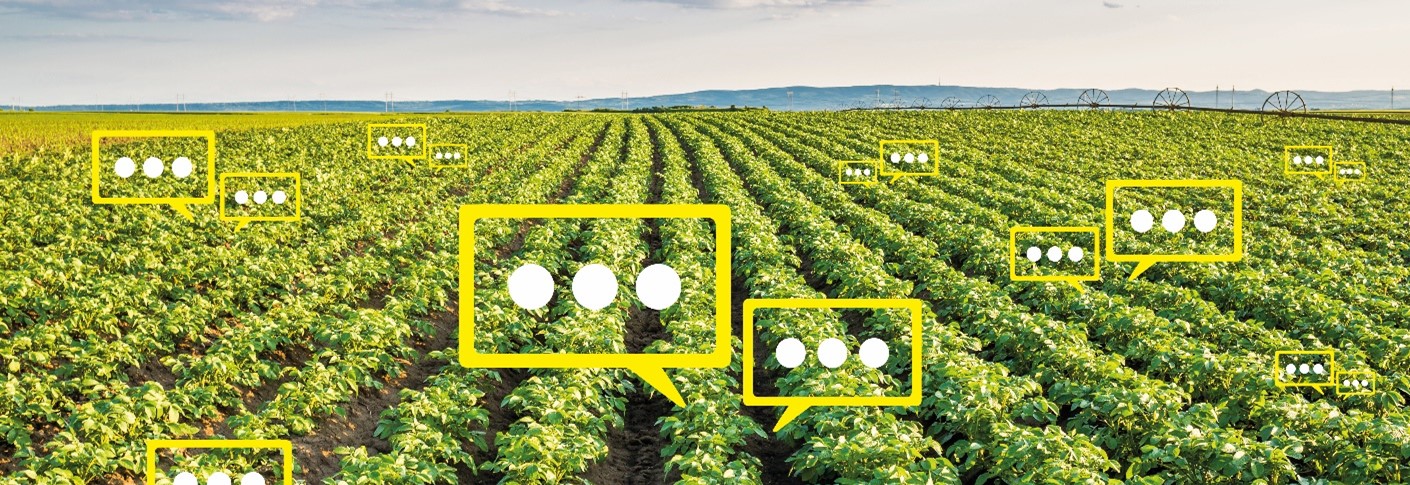Accelerating innovation in the field vegetable and potato sectors with crop sensors
31 October 2022 by Admin

Accelerating innovation in the field vegetable and potato sectors with crop sensors
Farmers can improve their production practices by experimenting in their own fields, but this can present challenges, and farmers are sometimes unsure how best to set up and manage their own experiments. The European project INNO-VEG aims to accelerate innovation in the field vegetable and potato sectors, by supporting farmers to carry out their own experiments, and demonstrating how crop sensors can be used for efficient data collection. INNO-VEG project partners Inagro, ADAS, Delphy and Arvalis shared results and experiences from the four year project at the final project event on 6 September hosted by Inagro in Belgium
Conducting research in commercially managed fields can bring challenges. For instance, the trial design must be simple and practical. It must also take into account the history and variation of the field. Moreover, the working widths of the grower or any contractors must be taken into account. "Tailoring precision agriculture, where all the puzzle pieces fall together for the individual farm, offers the greatest guarantee of long-term implementation," states Eva Ampe, research leader of precision agriculture at Inagro.
Easy for farmers to get started themselves
The project has shown that this site specific approach pays off. Growers actively participate in agricultural research, choose what they test in their fields and receive support from researchers. "The trials are designed and carried out completely tailored to the farm. We take into account available machinery, weather conditions, work planning.... This makes it easy for the farmer to work on their own afterwards," says Eva Ampe.
The INNO-VEG project partners produced a ‘Framework for farmer-led research’ that provides guidance to help growers to set up their own trials, also known as an on-farm trial. In addition, the project experiences using crop sensors have been compiled in a ‘Protocol’ with useful tips to help farmers, advisers, drone pilots and anyone wishing to use crop sensors for the first time on their way.
Using sensor data as an indicator of crop yield
In the typical design of such an on-farm trial, the trial treatments are applied to tramlines or crop beds in strips across the field. If the field is big enough, the treatments can be replicated alternately across the width of the field. Thus, results are statistically relevant and conclusions from trial are well-founded.
Lizzie Sagoo, Soil Scientist at ADAS, and INNO-VEG project leader, showed how growers can monitor their crop with crop sensors and use this data to assess the impact of treatments”ADAS have developed statistical methods to analyze spatial data such as yield maps and drone data. We used these methods in the INNO-VEG project to assess the effect of treatments on crop yields”
Hans Moggré, adviser on Arable Farming at Delphy, commented that sensor data are especially useful in crops for which automatic yield measurements do not yet exist. For most field vegetable crops included in INNO-VEG, the best correlations between sensor data and yield were found where sensor data was collected at the point of maximum crop canopy biomass, but before the start of senescence (in crops that senesce before harvest). Francesca Degan, soil, fertilisation and water management project manager at Arvalis, shared the tip that the best yield predictions in potatoes are achieved through a drone flight just at the start of senescence.
Drone services for the agrifood sector
The potential to make yield and task maps using drones attractedmany agri-consultants to the INNO-VEG closing event. Following the mornings technical presentations, there was an OpsDrone project workshop in the afternoon. The INNO-VEG project partners have been working in collaboration with the OpsDrone project which aims to lower the threshold for developing operational drone services in the agrifood sector.
Dries Raymaekers from the OpsDrone project, demonstrated that satellite images can also be used to predict yields during his demonstration of ‘Watch it grow’, a free platform developed by VITO that allows growers to monitor the crops in their fields during the growing season.
More innovation in the vegetable sector
The INNO-VEG partnership remains committed to promoting innovation in the agrifood sector. Inagro is working on other innovative projects for the vegetable sector, for example growing leeks hydroponically. During the closing event, attendees were able to visit a pilot system of hydroponically grown leeks at Inagro’s site and in operation since 2021. In this pilot installation, intended for demonstration and further scientific research, traditional soil cultivation has been replaced by outdoor hydroponics.
Attendees at the event heard about the operation and installation of the pilot plant, and future plans for automated harvesting. Tim De Cuypere, researcher in precision agriculture at Inagro said "thanks to the cooperation between research, growers and industrial partners, we are now, with the support of Vlaio, taking important steps in the development of a harvesting robot and the further automation of cultivation technology"
International innovation network
The INNO-VEG project partners have set up an Innovation Network to improve cooperation and communication between between the precision farming/sensor technology industry, research organisations and the field vegetable and potato crop sectors across the UK, France, Belgium and the Netherlands. The network is free to join by registration on the website. Members can add their profile to the members directory and add information on relevant services or projects. An innovation hub provides a forum for members to engage with each other, post updates and ask questions.
> Joining the innovation network is free and can be done at http://www.inno-veg.org.
Subscribe and stay up to date with project news.



